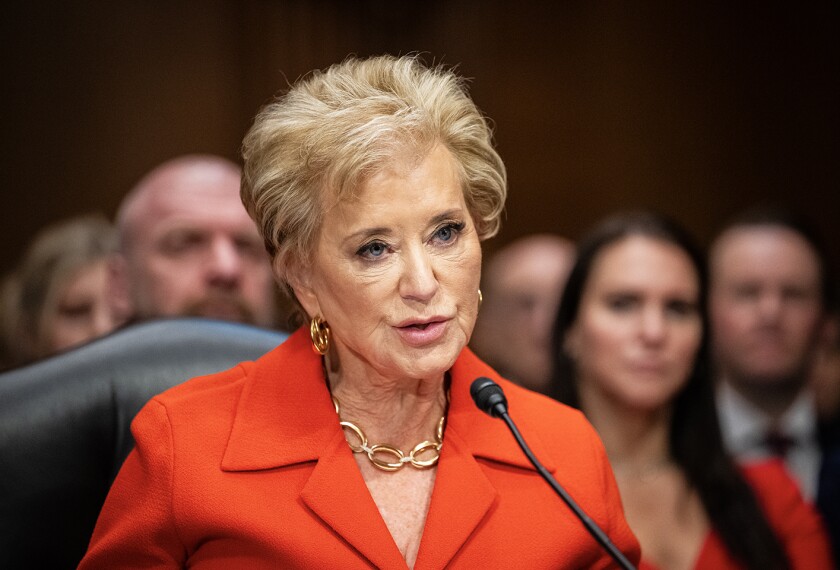A federal judge has set a January deadline for Arizona to find a way to adequately pay for programs for English-language learners or face fines of up to $2 million a day.
In the Dec. 15 ruling, U.S. District Judge Raner C. Collins gave the state until Jan. 24, or just 15 days following the start of its 2006 legislative session, to resolve the issue of paying for English-language learners or be fined $500,000 per day for 30 days. The fines would increase up to $2 million per day if the state continued to miss the court’s deadlines.
The ruling is the latest in the Flores v. Arizona school-finance lawsuit, which was filed in 1992. Six years ago, the U.S. District Court of Arizona ruled that the state did not sufficiently fund the education of English-language learners.
In the latest decision, the court added that English-language learners do not have to pass the state’s high school exam to receive a diploma until the state proves it has fixed the funding problem.
State Superintendent of Public Instruction Tom Horne said he will ask Arizona’s attorney general to file an appeal to the U.S. Court of Appeals for the Ninth Circuit.
Mr. Horne contended that the federal court has unfairly failed to take into consideration the amount of funding that the state receives from the federal government for English-language learners in determining that funding overall in Arizona for such students is inadequate. At the least, he said, the court should take federal funds into account and tell Arizona the amount that it needs to make up to provide a sound education for the state’s students with limited English skills.
Mr. Horne also disputed the court’s decision to exempt Arizona’s 160,000 English-language learners from the state’s high school exit exam until the funding matter is resolved.
The high school exit exam is part of Arizona’s Instrument to Measure Standards, or AIMS. “Until this ruling, these students were heavily motivated to become proficient in English. This ruling undercuts their motivation to acquire the skills they need to succeed in today’s economy,” Mr. Horne said in an interview.
He also noted in a written statement that by exempting students from the high school exit exam, there is a risk that teachers will divert their resources and efforts from assisting ELL students and concentrate on non-ELL students.
‘Pretty Effective Sanctions’
Timothy M. Hogan, the public-interest lawyer who filed the Flores v. Arizona lawsuit, said he is pleased with the court’s decision. “We got some pretty effective sanctions in place,” he said. “If they have a 100-day session and don’t do anything, the total would be $72.5 million.”
When asked if he thought the temporary lifting of the high-school-exit-exam requirement for English-language learners could divert teachers’ attention away from such students, Mr. Hogan said, “You have to have faith in the teachers, which I do.” He added that he doesn’t have faith in the legislature because it has missed previous deadlines set by the federal court to fix the problem.
Judge Collins ruled on Jan. 25 of this year that the legislature had until the end of April or the end of the 2005 legislative session—whichever was later—to find a solution. The legislature passed a bill at the end of its regular session to address the issue, but Gov. Janet Napolitano, a Democrat, vetoed it, saying the measure didn’t authorize enough aid for English-language learners.
Mr. Hogan, the executive director of the Arizona Center for Law in the Public Interest, said he also opposed that bill “because it wasn’t related to any known cost of providing ELL programs.”
The day before the federal court issued its Dec. 15 ruling, Mr. Horne issued a press release noting that he has asked Arizona’s congressional delegation to request $750 million in federal aid to help pay Arizona for what it costs to educate undocumented children.
“I would urge the Arizona delegation to push for an allocation of federal dollars to defray the costs to state taxpayers, who are currently bearing the burden of paying for the education of children who are not here legally,” Mr. Horne said in the Dec. 14 statement. Mr. Horne cited figures from the Pew Hispanic Center that Arizona has 125,000 undocumented children in its schools.
Jeffrey S. Passel, a senior research associate for the Pew Hispanic Center, said last week that while he had once stated that Arizona had 125,000 children of undocumented immigrants, a majority of those children were born in the United States and are thus American citizens. He estimates that Arizona actually has about 60,000 children who are living in the country illegally.
Mr. Horne said that “if the federal government had properly guarded the border, the children would never have been in school.” He said it’s unfair for Arizona taxpayers to have to bear so much of the burden of educating students who are living in the country illegally or those whose parents crossed the U.S.-Mexico border illegally.




